30+ Sample Business Consulting Contracts
-
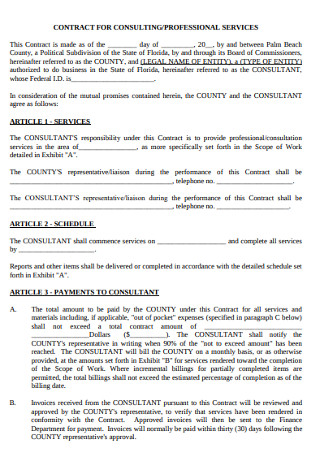
Professional Business Consulting Contract
-
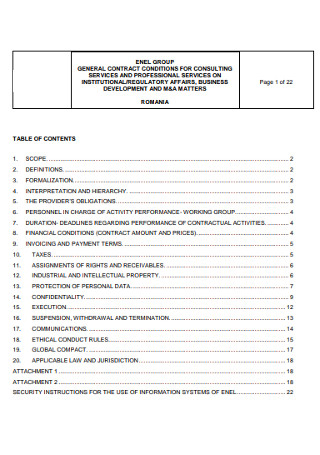
Business Development Consulting Contract
-
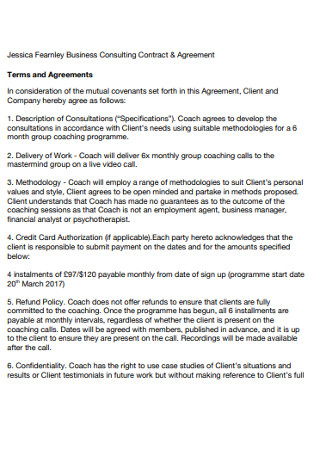
Business Consulting Contract and Agreement
-
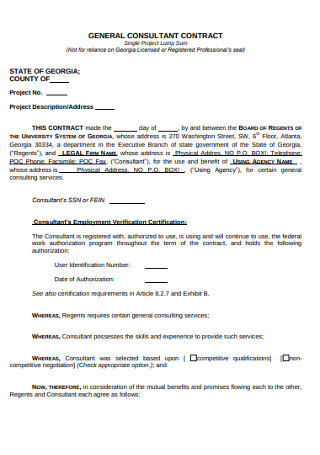
General Business Consultant Contract
-
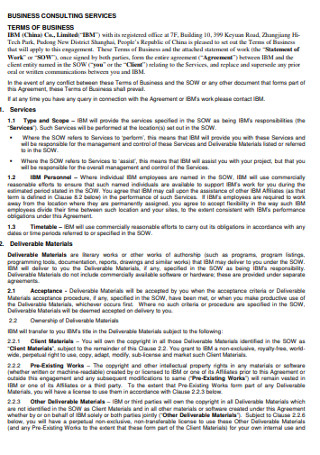
Sample Business Services Consulting Contract
-
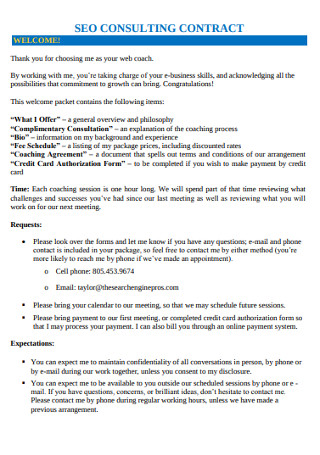 _
_Basic Business Consulting Contract
-
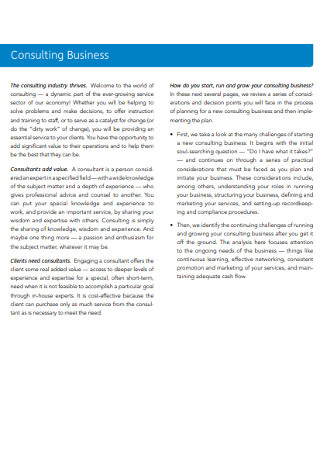
Business Consulting Contract in PDF
-
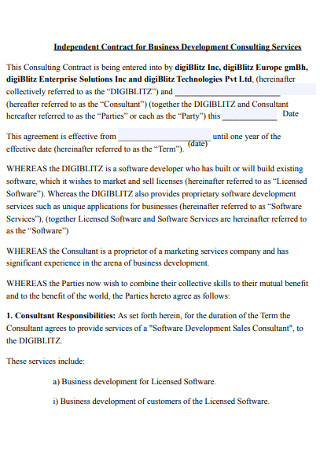
Independent Business Consulting Contract
-
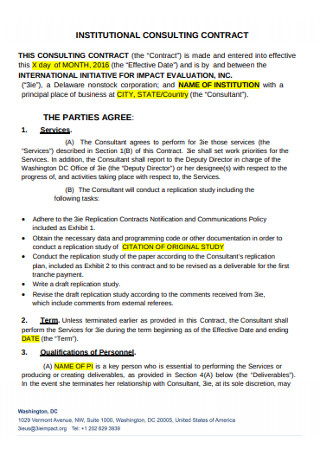
Institutional Consulting Contract
-
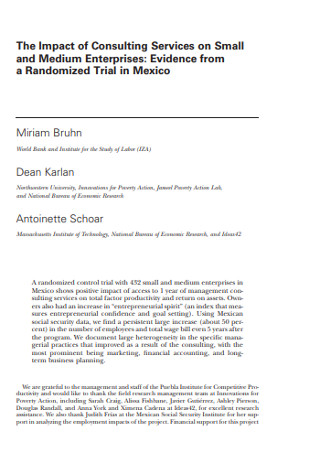
Enterprises Consulting Contract
-
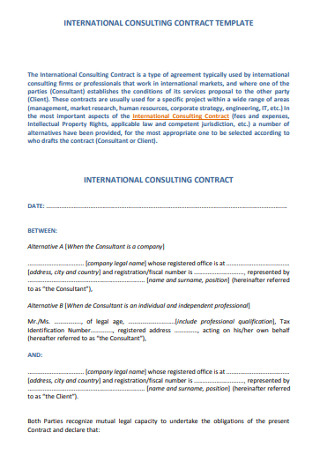
Sample Business Consulting Contract Template
-
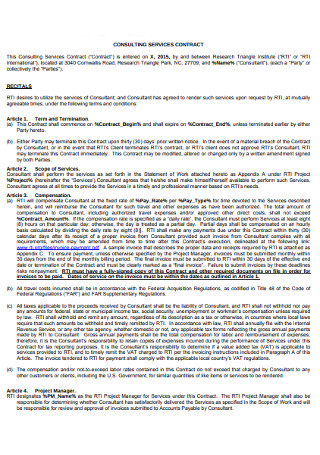
Simple Business Consulting Services Contract
-
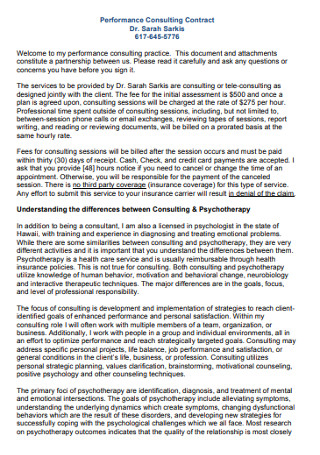
Business Performance Consulting Contract
-
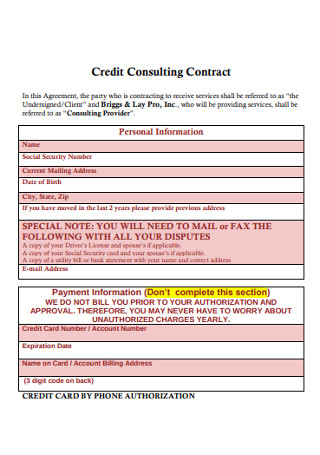
Business Credit Consulting Contract
-
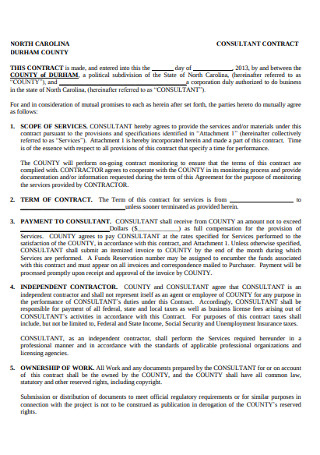
Simple Business Consultant Contract
-
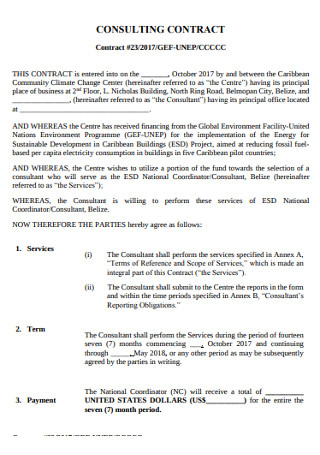
Printable Business Consulting Contract
-
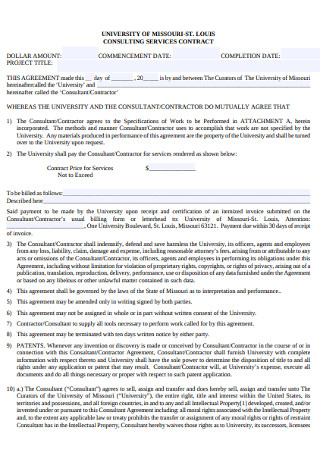
Formal Consulting Services Contract
-
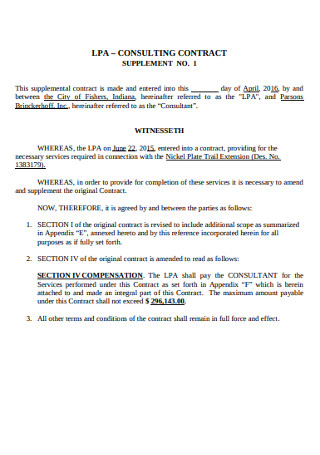
Business Consulting Contract Format
-
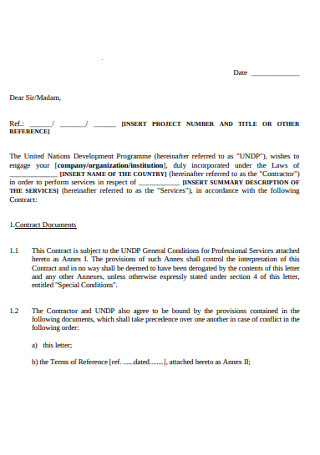
Company Consulting Contract
-
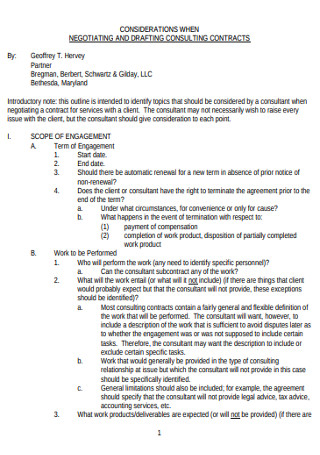
Consulting Consideration Contract
-
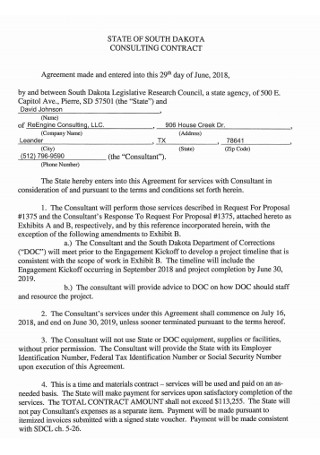
Sample Consulting Contract in PDF
-
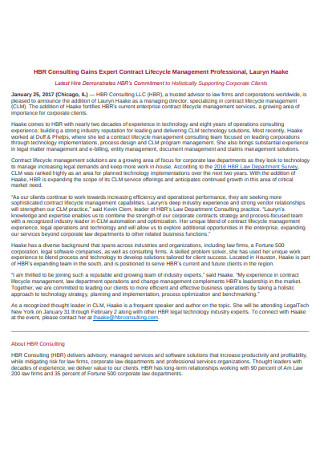
Consulting Management Contract
-
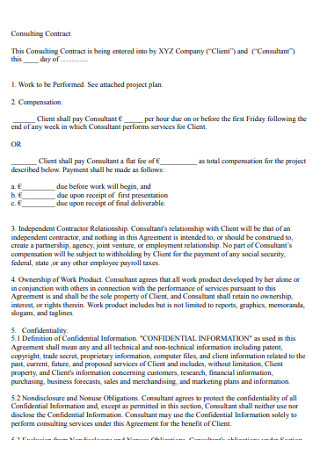
Professional Consulting Contract
-
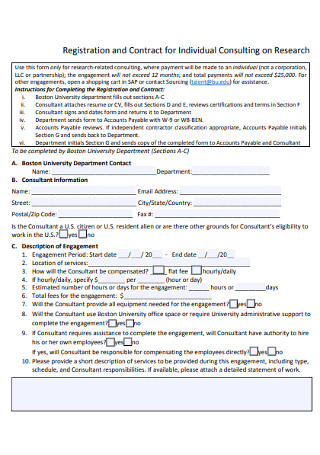
Individual Consulting Research Contract
-
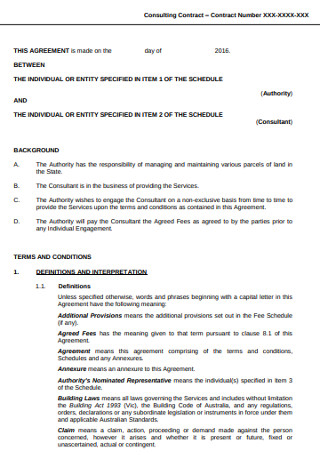
Consulting Contract Template
-
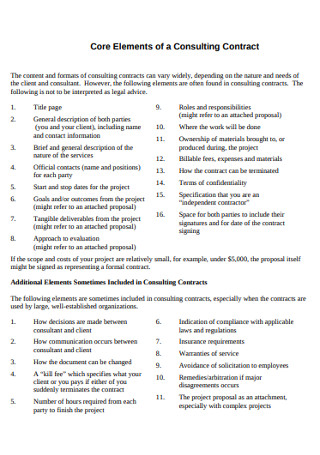
Core Elements of a Consulting Contract
-
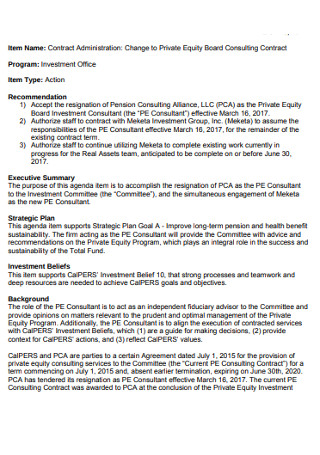
Consulting Administration Contract
-
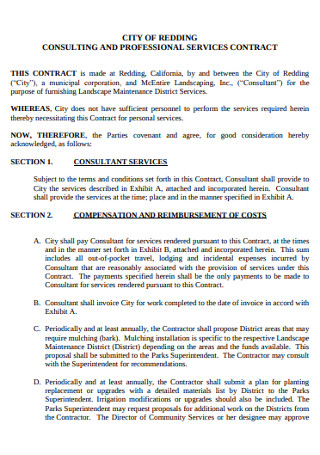
Consulting and Professional Services Contract
-
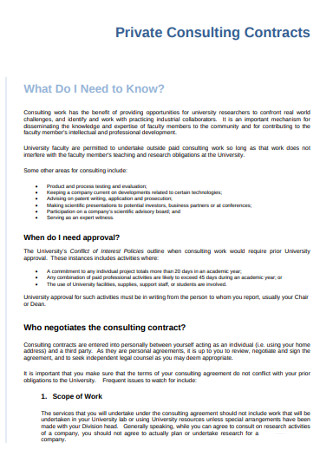
Private Consulting Contracts
-
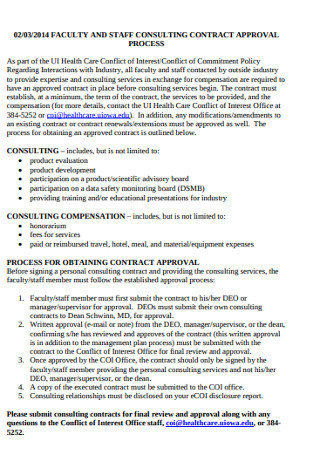
Faculty and Staff Consulting Contract
-
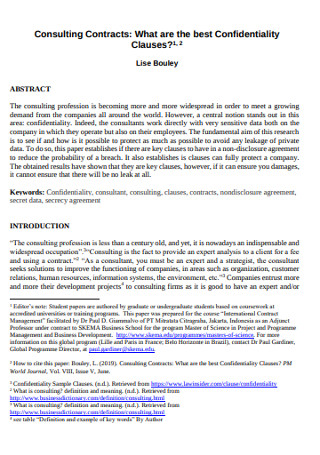
Sample Consulting Confidentiality Contract
-
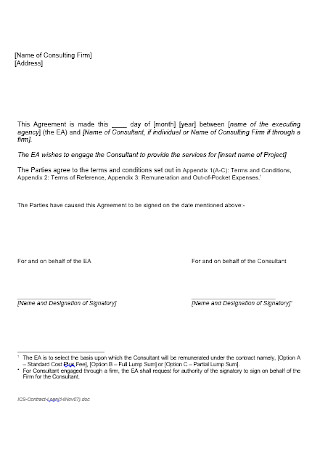
Business Consulting Service Contract Template
download now
Business consultants are contractors that offer valuable services to small to large-sized businesses. Consultants hold substantial if not expert knowledge and experience of their field. They also often hold a special license or certificate that proves their specialization and expertise. They usually hold an esteemed reputation in their field, which establishes them as an expert. Most of the time consultants are self-employed professionals who have relevant background and experience to practice their profession or skills.
Their services are availed by individuals or businesses to achieve a specific goal or improve a certain aspect of their business. Individuals or companies hire them to fill a gap that they cannot fill internally or would not be able to perform. Oftentimes these contracting parties are large firms, technology companies, medical and chemical companies, government agencies, insurance companies, law firms, and research companies, to name a few.
Consultants are most oftentimes contractors who are not considered employees but are hired on a contract basis to perform a specific function, solve a problem, train or manage and achieve a certain business goal or objective.
Aside from getting clients, another important consideration is to draw up a comprehensive business consulting contract before engaging with any company.
In this article, we will discuss the stats on business consulting, what is a business consulting contract, the types of business consultants, the reasons for needing a consultant, and how to prepare and make a business consulting contract.
What is a Business Consulting Contract?
A Business Consulting Contract is a legally binding document that lays down the specifics of the business engagement between the contractor or consultant and the contracting party or the business owner.
There are lots of benefits of being a business consultant, such as flexibility and scalability. Consultants own and manage their time, resources, and money as a self-employed professional. You are also able to deal with a variety of clients, and take as many clients as you want to handle. You can also demand a high rate on a per hour, daily, monthly, yearly or project basis. As an independent contractor, you must have a business consulting contract before engaging into business with any company.
A comprehensive and complete business consulting contract is mutually beneficial for both you, the consultant and the business owner, the contracting party. It offers protection for both, especially if one of the parties involved does not hold his or her end of the rope. A business consulting contract will help you assert the legality of the terms and conditions in the provision of your services, and the extent of engagement with the company or client.
Difference Between a Business Consulting Contract and a Business Consulting Proposal
A business consulting contract is a legally binding and formal document, while a consulting services proposal is a sales pitch of your consulting services to the client. A business consulting contract that you and the client has signed can be used for legal purposes and even in court litigations. On the other hand, a business consulting proposal is a document pitching your products or services to the client for his or her consideration and approval. When a client is looking to avail of your services and approves of your proposal, you and the client can take the next step which is the signing of the contract. You and the client will be bonded by the signed contract; in other words, you and the client should deliver on the items, terms, and deliverables set in the contract.
In this section, you will find sample business consulting contracts that you can refer to when you’re making a contract. A good business consulting contract template will contain the essential sections you can start to work on.
Types Of Business Consultants
According to the Consultant Journal, consultants can be divided into four (4) categories: Personal Consultants, Technical Consultants, Business Consultants, and Executive Consultants.
Technical Consultants – This type of consultant offers their technical expertise and technical knowledge to small and large-scale businesses. IT consultants, system administrator consultants, freelance software and web developers, graphic designers, researchers, copywriting consultants, digital marketing consultants, outsourced copy editors fall into this category. Technical consultants are industry experts in a technical field, who are hired
Business Consultants – Business consultants offer business counseling and services to clients and companies. These consultants extend their professional help to improve a certain business aspect of a company. This type of consultant range from certified public accountants (CPAs), tax consultants, attorneys, business counselors, marketing professionals, sales consultants to human resources consultants and business development coaches.
Executive Consultants – Executive consultants are high-profile consultants who are leading experts in their field. Because of their industry expertise and professional reputation, they usually charge above-average fees if not the highest fees among consultants for their knowledge and consultancy services. Medical consultants, legal consultant, executive consultants, and highly-skilled consultants fall into this category.
For this article, we will be focusing on business consultants, who offer their consultancy services to clients. If you are a business consultant, then this article will be of help to you, will guide you in making or improving your business consulting contract.
How to Prepare a Business Consulting Contract
First, you need to do your research on the business of your client. Find out what the client’s problems are that your services can solve. Before drafting the actual business consultation, it would be better to meet with your client. You can set up an initial consultation with the company or client to discuss their expectations, deliverables, timeline, and the results they want to achieve. The initial consultation will set you both on the right foot for the success of the project.
If you haven’t drafted a business consulting contract before, you can start with a ready-made and customizable business consulting contract template. Or you can look at a business consulting contract sample for inspiration and guide when you’re making the contract.
In this section, we will discuss the basic elements of the business consulting contract.
Elements of a Business Consulting Contract
Details of both parties engaged in the contract – Your business consulting contract must identify the parties of the contract. Include the details of both the contracting party and the contractor or consultant. Write out the business owner’s first and last name as well as the company’s name, address, contact information, tax identification numbers (TIN). And also your details specifically your first and last name, and your company’s name, address, contact information, and TIN.
Executive Summary or Background – This section provides a summary of the business engagement between the two parties — what you will provide as a consultant, and what the client needs from your services. You can also put your company background, your services, and the extent of the business engagement between you and the contracting party.
Project Scope – In this section, you will write down the scope of the project, and the terms of service. Here, you will outline the services to be performed as a contractor, and as to what extent. Here, you will write in detail the specific services you will render. You can also write down your qualifications for the project. Make sure that it is clear what tasks you will be performing, and stick with that. Make sure that your engagement is bounded by what is written in the contract, and nothing beyond that.
Limitations of Service – This will discuss the limitations, and extent of your services to the client. This section will discuss what are the inclusions and exclusions of your business engagement,
Independent Contractor Clause – Another important inclusion of the business consulting contract is the independent contractor clause. It identifies you as an independent contractor, and not a formal employee of the contracting party. The independent contractor clause should state that the contractor or consultant will waive his or her right to any benefits accorded to employees, such as health and medical benefits, vacation and sick leaves.
Terms and Termination – This section specifies the duration of the consultancy service — its commencement and end date. You can specify here the extent of your engagement in terms of hours, days, months or year. You can also provide a timeline which outlines the services that you will render, and when it will be delivered. You can also put the termination clause in this section so that both of you are on the same line. Indicate also whether the engagement can be terminated immediately, and the specific steps to be taken in cases of early termination of the project. If there’s a need for a notice of termination, your contract should explicitly state how many days should the other party provide due notice. You can indicate that the party wishing to terminate the engagement would have to put it in writing. In cases of early termination, you can push for a termination fee in the contract.
Billing Terms and Payment – Your billing terms and compensation for your professional consultancy services should be crystal clear in your contract. It should clearly state when and how are you going to bill the client and the corresponding professional fees. Here, you will state the payment terms and payment periods for rendering your services that the client should agree on. If the work requires periodic payments or upon project completion, make sure that it is stated in the contract. You can use a customizable Consulting Invoice Template that you can provide clients to get paid for your services. An invoice template can serve as a guide when you’re making an invoice to your clients. It can be easily customized according to your needs and preferences. Having a consulting invoice template will help you get paid on time as stated in your contract. You can easily modify the invoice template depending on the client and the project that you’re working on.
Non-disclosure agreement and Confidentiality Clause – As a business consulting contractor, you may be granted access to sensitive company information. Thus, the contract should explicitly state the non-disclosure agreement (NDA) and the confidentiality clause. This safeguards the interests of the client since it prevents the consultant to disclose or divulge any information that was disclosed to him during the engagement to the public. This section may also include a clause explicitly stating the confidentiality of the project. It might also include a non-competing clause which prohibits the consultant to undertake any projects of the client’s competitors.
Closing – The closing section of the contract contains a space for the signatures of the contractor and the contracting party or the business owner, and the date that it was signed and where. The signatures will serve as proof of the mutual agreement between the contractor and the contracting party. Make sure that both parties agree on what is stated in the contract. The contract is a legal document that binds both you and the contracting party on the terms, conditions, and clauses stated.
Dos and Don’ts When Making Business Consulting Contracts
Here are the to-dos to follow when you’re making a Business Consulting Contract.
The US Constitution has a Contract Clause, specifically Article 1, Section 10, Clause 1, which states, “No state shall pass any Law impairing the obligation of contracts.”
Do find a lawyer to review your contract – To make sure of the legality and enforceability of your business consulting contract, it is a wise move to have a lawyer, who specializes in contract, to review your document before presenting it to the client.
Do make sure that it is clear in the contract what type of consultancy services you will render. Especially when you are an expert in various aspects of the business, the contract should make it clear what specific consultancy service you will render.
Do put everything that you and your client has agreed on in writing. For your protection and the client as well, anything that you’ve agreed on should be put into writing. If you’ll be working on a long-term basis with the client, consider including a renewal provision or project continuity in the contract.
Be professional – It is said a lot of times, but you should always be professional in all your dealings with the client. Uphold your good reputation as a contractor by exhibiting professionalism at all time. Always respect the client and his or her employees, and abide by the company culture.
Be honest – Be honest in what you can deliver to the client, the services you can provide, the results you’ve attained in your previous projects, your company background, and any other information or stipulation stated in the contract.
Be sure to deliver on your promises – It is important that you can deliver what you’ve stated in the contract. Being able to provide the deliverables early, and on time will give you a positive reputation as a contractor. The quality of services should be at par or above industry standards. You should be able to provide what is required of you by the client, as mutually agreed in the contract. As a contractor, you are there to share your expertise and skills to help the client’s business to grow and achieve more. That’s why do keep in mind to deliver on your promises to the clients.
On the other hand, here are some of the things that you shouldn’t do.
Wrapping Up
Making sound business consulting contracts may seem daunting at first, but it should not be. Use this article as a guide when you’re drafting a contract to make the process easier. It is also a wise decision to consult with a lawyer, who is knowledgeable about contract laws, so you’re sure you will not have problems later on. Make sure that you meet with the client preferably face-to-face to discuss the contract in detail, so that any questions arising from the contract can be immediately addressed.
